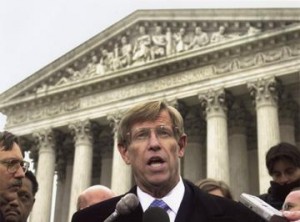Gay Marriage Battle’s Unlikely Leading Man
- Share
- Tweet
- Pin
- Share
Theodore “Ted” Olson has argued 55 cases before the United States Supreme Court. He represented George W. Bush in Bush v. Gore, the case that decided the 2000 Presidential Election. He served as Solicitor General under Bush and was once on his short list of candidates for appointment to the Supreme Court.
But in 2009 Olson signed on for what he says could be the most important case of his distinguished career. It’s certainly the most surprising.
Olson took the lead position on the legal team that fought to overturn Proposition 8, the California law banning same-sex marriage in Perry v. Schwarzenegger. Working with David Boies, his adversary in the Bush v. Gore case, Olson convinced Federal Circuit Court Judge Vaughn Walker that the law was unconstitutional. With that, a powerful conservative voice had struck a tremendous blow for gay rights and deepened one of the era’s greatest debates.
Olson’s family roots run deep in Door County, dating back to the 1860s, and both his parents were born and raised on the peninsula. Today he spends as much time as he can at his house in Northern Door County, but I finally caught up with him via phone at the Washington D.C. offices of his law firm, Gibson, Dunn & Crutcher, shortly before the New Year. Olson spoke candidly about the case, the evolution of his personal views on gay marriage, and the stifling limits of labels in our political discourse.
“My involvement in the case working with David has caused some people to think more deeply about the issue,” Olson said. “To recognize that this is not a liberal or a conservative issue, this is a civil rights issue and a constitutional issue.”

Theodore Olson talks to the media on the steps of the Supreme Court. Olson, who owns a home in northern Door County, is the lead attorney in the case that overturned California’s gay marriage ban in August of last year.
Olson has long been considered a leading conservative legal scholar, but he has departed from conservative norms before. He has argued against federal sentencing guidelines, on behalf of journalist’s rights to protect sources, and most recently he spoke up in defense of the right of a Muslim organization to build a community center near the World Trade Center site. That argument carried particular weight, since Olson’s third wife, Barbara, was killed in the 9/11 attacks.
Such departures demonstrate the limits of a national discourse that so often devolves into a shouting match between two sides seeking strict, easy definitions of each other.
“When you start to put people in a pigeonhole, you expect them to act and think like everyone else in that pigeonhole,” Olson said. “It gives you an excuse not to think about what people say and do. An excuse to say, ‘they’re not like me and therefore I don’t like them and what they say,’ rather than consider their opinions and ideas.”
In January of 2010, Olson penned a long essay for Newsweek titled “The Conservative Case for Gay Marriage,” in which he argued that marriage, even gay marriage, is a conservative value.
But not everybody feels that way. Some critics of Olson’s on the right have slammed him, suggesting he is simply seeking the limelight that comes with such a prominent case.
“While some will think that this is an unpardonable error and rethink their views on Ted,” his longtime colleague and Northwestern University law professor Steven G. Calabresi told the New York Times, “I think it will cause others to take a second look at the argument he is making.”
“Libertarian-minded conservatives are more supportive,” Olson said. “Some conservatives feel it’s not something they could support, and some are in the middle.”
But Olson said he believes he has changed some minds on the right since taking on the case.
“I did an interview with Chris Wallace on Fox News in August, and I got many letters from people who said that they were rethinking their view of the issue or changed their mind after seeing it,” he said. “I do think it’s making an impact.”
Olson got involved in the case when Rob Reiner, the Hollywood director, approached him to see if he would get involved.
“He and others in California were concerned that the lawyers who had taken the cases before had approached it in a way that might have been shortsighted,” Olson said.
He was willing to take on the case, but he recognized that with his reputation as a high-profile conservative figure, his leadership on the case might not be viewed favorably. In another unconventional move, he suggested that David Boies be brought in on the case, forming an unlikely team of superlawyers.
Olson explained that his own views on gay rights are the product of a lifetime of experiences.
“My parents, who were from Wisconsin, taught my siblings and I that respect for individuals of different backgrounds, ethnicity, race, and sexual orientation was important,” he said. “Respect and compassion for other people’s dignity were things we grew up with.
“And as you go through life you evolve, and as you come to know people of different sexual orientations you come to realize that they’re just like you. They’re your neighbors, your sons, your daughters. Why wouldn’t you want them to have the same opportunities, to have the same rights, as everybody else? Why would you not treat them equally?”
Olson explained how the laws of the state have implications that reach far beyond legality. Just as parents and adults model behavior for children, the state models behavior for larger society.
“I’ve never believed that it’s right to discriminate against an individual,” Olson said, “and when the state sanctions that discrimination, it tells everybody in that community that these individuals are different, that it’s okay to point at them, to treat them differently. It fosters discrimination, and it inferentially condones that discrimination, which can sometimes elevate to violence. This case has taught me a lot about the psychological impacts of discrimination and the detrimental effects it has over time.”
The Perry v. Schwarzenegger decision brought another common label to the forefront, that of “activist judge,” one many have glued to Judge Walker. Olson has used the charge himself in the past but said the activist judge label isn’t appropriate in this case – and many others when civil rights are on the table.
“People tend to say ‘activist judges’ when they see a judgment they don’t like or don’t agree with,” he said.
This sparked an explanation by Olson of precisely why the constitution requires that judges have the strength to go against majority opinion.
“In our government, there have to be constitutional limits on what the majority can do,” he said. “You have to have an independent judiciary to protect people when the majority gets out of hand. The judiciary is the strength against the violation of civil rights. It has to have the power to make unpopular decisions to protect individuals constitutional rights.”
Proponents of Proposition 8 are now fighting for the legal standing to appeal Judge Walker’s decision, and Olson said it’s likely the case will end up in the Supreme Court. A win there would strike down gay marriage bans across the country, but even if it doesn’t make it that far, Olson said the California decision has implications far beyond the west coast.
“It makes it easier for other judges to look at this decision and say, I agree with what the 9th Circuit Court has done,” he said. “There’s a standard there that makes it easier for individuals to fight these laws in other states. Congress just overturned Don’t Ask Don’t Tell, so gradually these barriers are coming down.”
Looking for more on Ted Olson? His involvement in the Perry v. Schwarzenegger has garnered nationwide attention. Here are a few links to other articles about Olson and the case.
Update: Court Rejects One Challenge to Gay Marriage Ruling, Pass on Another, Truthout
A Conservative’s Road to Same-sex Marriage Advocacy, New York Times
Olson surprises many conservatives by seeking to overturn gay-marriage ban, Washington Post
Ted Olson, Gay Marriage’s Unlikely Legal Warrior, NPR
Ted Olson, A Conservative for Civil Rights, The Atlantic
A Rebuttal to Theodore Olson, The American Spectator
Ted Olson Pushes for Judicially Mandated Gay “Marriage,” Redstate.com

